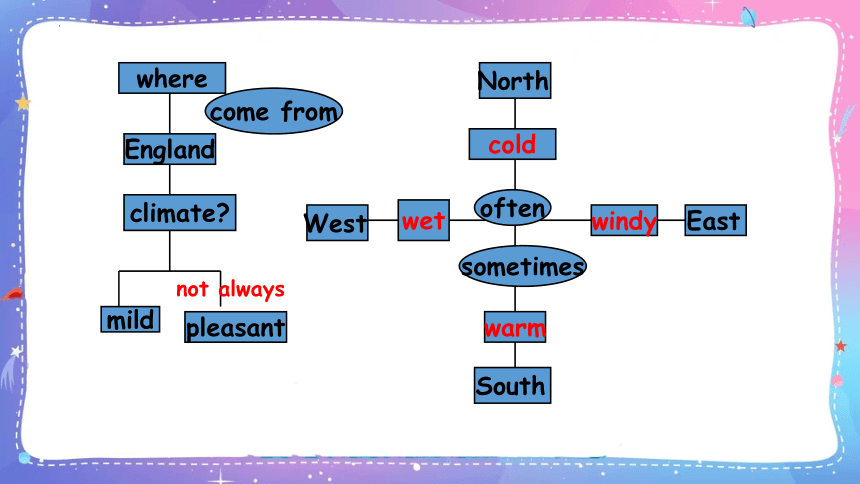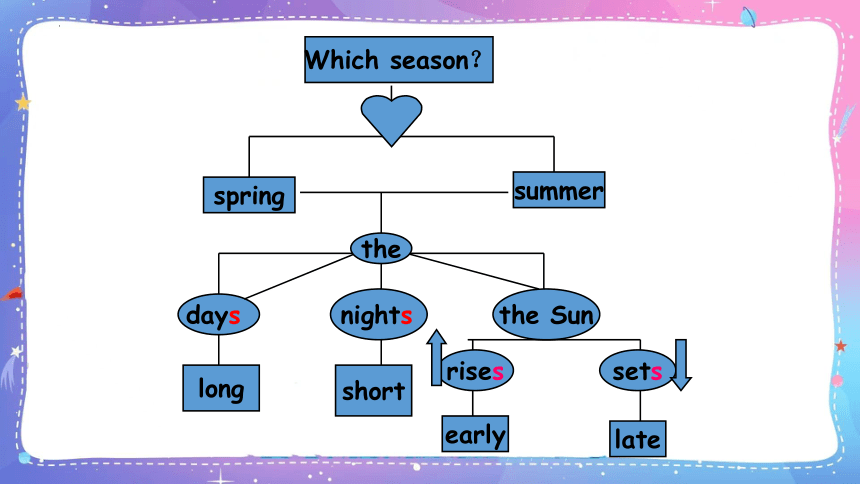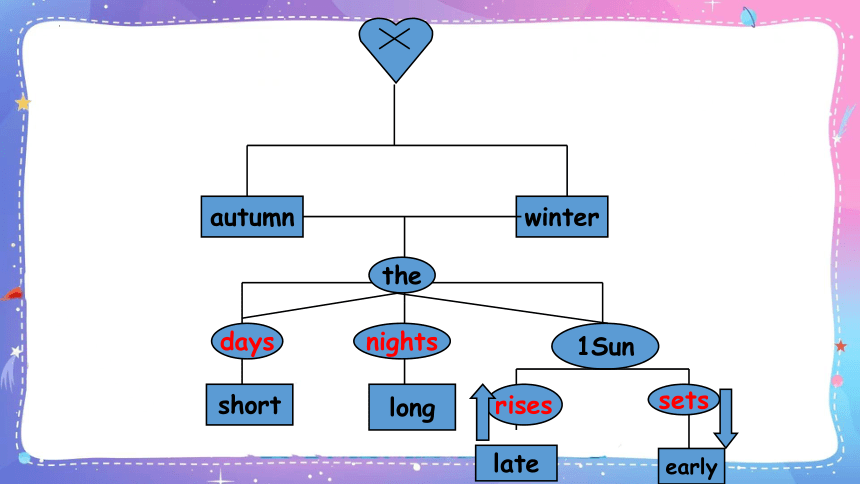新概念英语第一册Lesson55-56课件(共84张PPT)
文档属性
| 名称 | 新概念英语第一册Lesson55-56课件(共84张PPT) |

|
|
| 格式 | zip | ||
| 文件大小 | 5.6MB | ||
| 资源类型 | 教案 | ||
| 版本资源 | 新概念英语 | ||
| 科目 | 英语 | ||
| 更新时间 | 2022-06-02 07:07:17 | ||
图片预览












文档简介
(共84张PPT)
新概念Lessson55-56
Review
1
Review
China
Chinese
Canada
Canadian
England
English
Russia
Russian
Review
America
American
France
French
Australia
Australian
korea
Korean
Review
Italy
Italian
Germany
German
Greece
Greek
Japan
Japanese
Review
1 .Where do you come from
I come from China.
Where are you from
I’m from China.
2. What nationality are you
I’m Chinese.
Review
1 .Where does he come from
He comes from China.
Where is he from
He’s from China.
2. What nationality are you
He’s Chinese.
写出下列动词的三单形式
like- help-
enjoy- play-
study- try-
pass- fix-
wash- watch-
go- do-
have- fly-
likes
helps
enjoys
plays
studies
tries
passes
fixes
washes
goes
does
watches
has
flies
Review the text
where
England
climate
mild
pleasant
not always
North
West
East
South
cold
wet
windy
warm
often
sometimes
come from
Which season?
spring
summer
long
short
early
late
days
nights
the Sun
rises
sets
the
autumn
winter
short
long
1Sun
late
early
rises
sets
days
nights
the
Let's start
New words
live [l v] v. 住,生活
stay [ste ] v. 呆在,停留
home [h m] n. 家;adv. 到家
housework ['ha sw k] n. 家务
lunch [l n ] n. 午饭
afternoon [ɑ ft 'nu n] n. 下午
P110
New words
usually ['ju u li] adv. 通常
together [t 'ge ] adv. 一起
evening ['i vn ] n. 晚上
arrive [ 'ra v] v. 到达
night [na t] n. 夜间
New words
usually
together
evening
arrive
night
live
stay
home
housework
lunch
live v. 住,生活(是指长久的居住,住在自己家中)
Where do you live 你住在哪里?
live in .....后接国家名称或城市名称(接大地点)
I live in China. 我住在中国。
I live in Beijing. 我住在北京。
live at …..后面接确切的地址 (接小地点)
The sawyers live at 87 King Street.
索耶一家住在国王街87号
单词讲解
stay v. 呆在,停留(是指临时,短时间的居住)
stay in …… 呆在家里不出去
(尤其指呆在家里不出去)
eg: They always go out to the club at night,but I stay in and watch TV.
stay with sb……和某人呆在一起。
eg: She stays with me.她和我呆在一起。
home n. 家 ;adv. 住家,到家
housework n. 家务
1) n. 家
eg: Welcome to my home .
at home 在家
eg: She always stays at home.
adv. 住家,到家
go home 回家
eg: I must go home now.
come home 到家
eg: she always comes home late.
do the housework 做家务
housewife 家庭主妇
lunch n.
afternoon n. 下午
breakfast n. 早餐
supper n. 晚饭
have breakfast 吃早餐
have lunch 吃午饭
have supper 吃晚饭
morning n. 早上
evening n. 晚上
In the morning 在早上
In the afternoon 在中午
In the evening 在晚上
usually adv. 通常
together adv. 一起
together 做副词常放在句末
eg: We usually do our homework at home .
eg: She usually cleans her room in the evening .
eg :My best friend and I live together.
eg :We sometimes drink coffee together.
evening n. 晚上
night n. 夜间
一般指下午以后和上床睡觉前这段时间比night的时间要早。
night 一般指夜里
good night 晚安
at night 在夜里
all night along 一整夜
arrive v. 到达
arrive in 后面一般接城市或国家
arrive in France
arrive 后面可直接加副词
arrive here
arrive there
arrive home
arrive at 后面接的地点,一般是公共场所或某座大楼
arrive at the hotel
New words
live [l v] v. 住,生活
stay [ste ] v. 呆在,停留
home [h m] n. 家;adv. 到家
housework ['ha sw k] n. 家务
lunch [l n ] n. 午饭
afternoon [ɑ ft 'nu n] n. 下午
P110
New words
usually ['ju u li] adv. 通常
together [t 'ge ] adv. 一起
evening ['i vn ] n. 晚上
arrive [ 'ra v] v. 到达
night [na t] n. 夜间
26
Lesson 55 The Sawyer family.
Let's listen
你的答案
Your Answer
Question
This a story about the Sawyer’s family
Listen carefully and answer the question -----
What do the children always do at night
1
What do the children always do at night
2
When do the children do their homework
3
What does Mr. Sawyer do in the morning
Reading the text
1
What do the children always do at night
2
When do the children do their homework
3
What does Mr. Sawyer do in the morning
At night, before they go to bed.
They always do their homework.
He goes to work.
The text
3
The Sawyers live at 87 King Street.
1. the Sawyers 是指索耶一家。 在英文中,姓氏后面加-s,前面加上定冠词the,用来指一家人,特别是丈夫和妻子。例如:the Smiths.
live in 住在…(国家或城市)
live at 住在…(有确切地址的小地方)
1. live 住、 生活
live in 住在……(国家或城市)
live at 住在……(有确切地址的小地方)
live on/by 以....为主食,以.....为主
I live_____ 58 Renshou Road.
I live_____ Renshou Road.
He lives ___ England.
at
in
in
In the morning, Mr. Sawyer goes to work and the children go to school.
Mrs. Sawyer stays at home every day. She does the housework.
She always eats her lunch at noon.
此段使用的是哪个时态?
上文中出现了几个动词?分别是哪些?
这些动词的共同点是什么?
一般现在时
1.定义:表示经常反复发生的动作或存在的状态。
2.标志词:often usually sometimes always never seldom every day / year(行为动词前面,系动词后面)
3.构成:
1)肯定句:主语+V原或V单三
2)否定句:主语+don’t /doesn’t +V原
3)一般疑问句:Do/Does +主语+V原
“三单”
以ch,sh,s,o,x结尾的动词在词尾加-es teach-teaches wash-wash go-goes pass-passes
第三人称单数形式
以辅音字母加y结尾的动词,先将y变i再加-es study-studies try-tries
以元音字母加y结尾的动词,在词尾加-s stay-stays play-plays
practice
1 The children in the morning.(go to school)
2 Their father them to school.(take)
3 Mrs. Sawyer at home. (stay)
4 She the housework.(do)
5 She always her lunch at noon.( eat)
goes to school
takes
stays
does
eats
动词
go to work 去上班
go to school 去上学
stay at home 呆在家
do the housework 做家务
do the homework 做作业
eat her lunch 吃午餐
她通常在下午去上班。
She usualy goes to work in the afternoon.
她常常在早上做家务。
She often does the housework in the mornong.
他们通常在晚上做作业。
They usually do the homework in the evening.
他总是在正午吃饭。
He always eats his lunch at noon.
主+频+实义动词+时间
stay v.呆在,停留
表示临时,短时间居住
stay at home 呆在家 stay at a hotel 住旅馆
stay in bed 呆在床上 stay with sb. 和某人呆在一起
stay at sb's house 住在某人的家中
live 是指长久的住,住在自己的家中
eg. I live in a partment.
我住在公寓里。
home n.家;adv. 在家,到家
1) n.家
make oneself at home. 请随便一点,放松一点。
leave home 离家出走
eg. Make yourself at home. 请随便一点。
2)adv. 在家,到家
go home 回家
eg. When do you go home
come home 到家
eg. She always comes home late.
housework n.家务
house n. 住宅;家庭 work n. 工作
do the housework 做家务
do the homework 做作业=do one's homework
eg: 你在家经常做家务吗?
Do you often do housework at home
clean the floor
wash the dishes/clothes
cookdinner/breakfast/lunch
lunch n.午饭
eat lunch = have lunch 吃午饭
一日三餐前的冠词必须省略,而且,表示吃饭的“吃”既可用 eat ,也可用 have
吃早饭
吃晚饭
eat(have) breakfast
eat(have) supper(英)
eat(have) dinner (美)
morning n.早上
moning 早上 ,在早上:in the moning
afternoon 下午, 在下午:in the afternoon
evening 晚上, 在晚上: in the evening
night :夜晚, 在夜晚: at night
noon 正午 at noon在正午
in the evening则是泛指在晚上,
晚上6点左右)
at night是指在深夜,通常11点左右
In the afternoon, she usually sees her friends. They often drink tea together.
下午,她总是会见她的朋友。
她们经常在一起喝茶。
一般现在时的用法:
当主语是第三人称时,它的构成是:?
当主语不是第三人称时,它的构成是:?
usually adv. 通常
指经常发生的,习惯性的动作,一般与一般现在时连用
eg:我通常都中午才起床
I usually get up at noon.
我经常不吃早饭
I usually don’t eat breakfast.
always 总是
often 经常
sometimes 有时
together adv.一起
eg:我们一起聚会吧
Let’s have a party together!
他们经常一起购物
They often go shopping together.
兄弟们一起上
Brothers! Together up!
他们经常一起去吃饭。
They often have lunch together.
In the evening, the children come home from school. They arrive home early.
Mr. Sawyer comes home from work. He arrives home late.
arrive是不及物动词,后面不能直接跟名词作宾语,我们通常加上一个介词。
arrive in 到达……(大地方)
arrive at 到达……(小地方)
arrive v. 到达
arrive是不及物动词,后面不能直接跟名词作宾语,我们通常加上一个介词。
arrive in 到达…( 大地方)
arrive at 到达……(小地方)
My father will arrive in London tomorrow.
I often arrive home early in the evening.
get to / reach 到达……
arrive / get / reach home 到家, home本身可以做为副词,所以其前面不加介词。
At night, the children always do their homework. Then they go to bed.
Mr. Sawyer usually reads his newspaper, but sometimes he and his wife watch television.
their v. 他们的
【形容词性物主代词】:
单数:my(我的)your(你的)his /her/its(他她它的)。
复数:our(我们的)your(你们的)their(他们的)。
形容词性物主代词具有形容词的特性,常放在名词前面作定语,表明该名词所表示的人或物是\谁的\或xx belongs to sb.
动词
go to work 去上班
go to school 去上学
stay at home 呆在家
do the housework 做家务
do the homework 做作业
eat her lunch 吃午餐
see friends 见朋友
drink tea 喝茶
come home 到家
arrive home 到家
go to bed 睡觉
read newspaper 读报
watch TV 看电视
1. Where do the Sawyers live
2. In the morning, what does Mr. Sawyer do
What do the children do What does Mrs. Sawyer do
3. At noon, who always eats lunch at home Mr. or Mrs. Sawyer
4. In the afternoon, what does Mrs. Sawyer usually do
What do they often do
5. In the evening, do the children arrive home early
Listen again, and answer these questions:
1. Where do the Sawyers live
2. In the morning, what does Mr. Sawyer do What do the children do What does Mrs. Sawyer do
They live at 87King Street.
Mr. Sawyer goes to work.
The children go to school.
Mrs. Sawyer stays at home and does the housework.
3. At noon, who always eats lunch at home Mr. or Mrs. Sawyer
4. In the afternoon, what does Mrs. Sawyer usually do What do they often do
Mrs. Sawyer.
She usually sees her friends.
They often drink tea together.
5. In the evening, do the children arrive home early
Yes, they do.
6. At night, what does Mr. Sawyer usually do What does he sometimes do with his wife
Mr. Sawyer usually reads his newspaper.
Sometimes he and his wife watch television.
Do some exercises
4
c
B
A
D
1. ( ) I often _____ up at 7:oo in the morning. My mother often _____up at 6:30.
A. get, get B. gets, gets C. get, gets D. gets, get
2. ( )Jim’s brother ____ in a factory. He usually _____ to work by car.
A. work, go B. works, goes C. works, go D. work, goes
3. ( ) ____ you always ____ basketball on Sundays
A. Do, play B. Does, play C. Are, playing D. Are, play
4. ( ) _____ your father often____ TV in the evening
A. Do, watch B. Does, watches C. Does, watchs D. Does, watch
c
B
A
D
1. ( ) I often _____ up at 7:oo in the morning. My mother often _____up at 6:30.
A. get, get B. gets, gets C. get, gets D. gets, get
2. ( )Jim’s brother ____ in a factory. He usually _____ to work by car.
A. work, go B. works, goes C. works, go D. work, goes
3. ( ) ____ you always ____ basketball on Sundays
A. Do, play B. Does, play C. Are, playing D. Are, play
4. ( ) _____ your father often____ TV in the evening
A. Do, watch B. Does, watches C. Does, watchs D. Does, watch
1. 格林太太总是在家中吃午饭。
2. Jimmy has lunch at home.(改成否定句)
3. She often does her homework at night.(改一般疑问句)
4. Jim often watch TV at home in the evening.(改为否定句和一般疑问句)
Mrs.Green lunch at home.
Jimmy doesn't have lunch at home.
Does she often do her homework at night
Jim doesn't often watch TV at home in the evening.
Does Jim often watch TV at home in the evening
has
always
1. 记单词和词组,下周听写
2. 朗读课文
Lesson 56
What do they usually do
看图,猜一猜
go to bed
go to work
stay at home
看图,猜一猜
have lunch
do the housework
drink tea
看图,猜一猜
read newspaper
do the homework
watch TV
一般现在时
1.定义:表示经常反复发生的动作或存在的状态。
2.标志词:often usually sometimes always never seldom every day / year(行为动词前面,系动词后面)
3.构成:
1)肯定句:主语+V原或V单三
2)否定句:主语+don’t /doesn’t +V原
3)一般疑问句:Do/Does +主语+V原
usually adv. 通常
What do you usually do+时间
I usually play on the computer.
What do you usually do+时间?
dusts the cupboard
makes the bed
shaves
cleans the blackboard
go to bed
listen to the stereo
What do you usually do+时间?
washes the dishes
type some letters
drinks some milk
washes the dishes
type some letters
What do you usually do+时间?
watch TV
eats her lunch
reads his newspaper
What do you usually do+时间?
词组
dusts the cupboard
makes the bed
shaves
cleans the blackboard
go to bed
listen to the stereo
drinks some milk
washes the dishes
type some letters
watch TV
eats her lunch
reads his newspaper
此处添加标题
Practice
此处添加标题
What does she do every day
She drinks milk every day.
此处添加标题
What do your parents do every day
They usually drink milk every day.
此处添加标题
What does your grandmother do
in the afternoon
She often reads newspaper in the afternoon.
此处添加标题
What does your brother usually do in the evening
He usually watches TV in the evening.
此处添加标题
What do they always do at night
They always watch TV at night.
此处添加标题
What does Jack often do in the evening
He often washes the dishes in the evening.
此处添加标题
What does Bob usually do at noon
He usually has lunch at noon.
c
B
A
D
Do some exercises:
( ) I often _____ up at 7:oo in the morning. My mother often _____up at 6:30.
A. get, get B. gets, gets C. get, gets D. gets, get
2. ( )Jim’s brother ____ in a factory. He usually _____ to work by car.
A. work, go B. works, goes C. works, go D. work, goes
3. ( ) ____ you always ____ basketball on Sundays
A. Do, play B. Does, play C. Are, playing D. Are, play
4. ( ) _____ your father often____ TV in the evening
A. Do, watch B. Does, watches C. Does, watchs D. Does, watch
1. My sister often goes to school on foot. (对划线部分提问)
2. Jimmy has lunch at home.(改成否定句)
3. My father usually reads newspapers in the morning.
(对划线部分提问)
4. She often does her homework at night.(改一般疑问句)
How does your sister go to school
Jimmy doesn't have lunch at home.
What does your father usually do in the moring
Does she often do her homework at night
1.抄L55-56单词 4英1中,默写1遍
2.微信语音:跟读L55.课文并背诵;
熟读所学课文背诵,熟记单词和语法
3.完成练习册L55-56(写作必须完成)
4.预习57的单词和课文
Homework
新概念Lessson55-56
Review
1
Review
China
Chinese
Canada
Canadian
England
English
Russia
Russian
Review
America
American
France
French
Australia
Australian
korea
Korean
Review
Italy
Italian
Germany
German
Greece
Greek
Japan
Japanese
Review
1 .Where do you come from
I come from China.
Where are you from
I’m from China.
2. What nationality are you
I’m Chinese.
Review
1 .Where does he come from
He comes from China.
Where is he from
He’s from China.
2. What nationality are you
He’s Chinese.
写出下列动词的三单形式
like- help-
enjoy- play-
study- try-
pass- fix-
wash- watch-
go- do-
have- fly-
likes
helps
enjoys
plays
studies
tries
passes
fixes
washes
goes
does
watches
has
flies
Review the text
where
England
climate
mild
pleasant
not always
North
West
East
South
cold
wet
windy
warm
often
sometimes
come from
Which season?
spring
summer
long
short
early
late
days
nights
the Sun
rises
sets
the
autumn
winter
short
long
1Sun
late
early
rises
sets
days
nights
the
Let's start
New words
live [l v] v. 住,生活
stay [ste ] v. 呆在,停留
home [h m] n. 家;adv. 到家
housework ['ha sw k] n. 家务
lunch [l n ] n. 午饭
afternoon [ɑ ft 'nu n] n. 下午
P110
New words
usually ['ju u li] adv. 通常
together [t 'ge ] adv. 一起
evening ['i vn ] n. 晚上
arrive [ 'ra v] v. 到达
night [na t] n. 夜间
New words
usually
together
evening
arrive
night
live
stay
home
housework
lunch
live v. 住,生活(是指长久的居住,住在自己家中)
Where do you live 你住在哪里?
live in .....后接国家名称或城市名称(接大地点)
I live in China. 我住在中国。
I live in Beijing. 我住在北京。
live at …..后面接确切的地址 (接小地点)
The sawyers live at 87 King Street.
索耶一家住在国王街87号
单词讲解
stay v. 呆在,停留(是指临时,短时间的居住)
stay in …… 呆在家里不出去
(尤其指呆在家里不出去)
eg: They always go out to the club at night,but I stay in and watch TV.
stay with sb……和某人呆在一起。
eg: She stays with me.她和我呆在一起。
home n. 家 ;adv. 住家,到家
housework n. 家务
1) n. 家
eg: Welcome to my home .
at home 在家
eg: She always stays at home.
adv. 住家,到家
go home 回家
eg: I must go home now.
come home 到家
eg: she always comes home late.
do the housework 做家务
housewife 家庭主妇
lunch n.
afternoon n. 下午
breakfast n. 早餐
supper n. 晚饭
have breakfast 吃早餐
have lunch 吃午饭
have supper 吃晚饭
morning n. 早上
evening n. 晚上
In the morning 在早上
In the afternoon 在中午
In the evening 在晚上
usually adv. 通常
together adv. 一起
together 做副词常放在句末
eg: We usually do our homework at home .
eg: She usually cleans her room in the evening .
eg :My best friend and I live together.
eg :We sometimes drink coffee together.
evening n. 晚上
night n. 夜间
一般指下午以后和上床睡觉前这段时间比night的时间要早。
night 一般指夜里
good night 晚安
at night 在夜里
all night along 一整夜
arrive v. 到达
arrive in 后面一般接城市或国家
arrive in France
arrive 后面可直接加副词
arrive here
arrive there
arrive home
arrive at 后面接的地点,一般是公共场所或某座大楼
arrive at the hotel
New words
live [l v] v. 住,生活
stay [ste ] v. 呆在,停留
home [h m] n. 家;adv. 到家
housework ['ha sw k] n. 家务
lunch [l n ] n. 午饭
afternoon [ɑ ft 'nu n] n. 下午
P110
New words
usually ['ju u li] adv. 通常
together [t 'ge ] adv. 一起
evening ['i vn ] n. 晚上
arrive [ 'ra v] v. 到达
night [na t] n. 夜间
26
Lesson 55 The Sawyer family.
Let's listen
你的答案
Your Answer
Question
This a story about the Sawyer’s family
Listen carefully and answer the question -----
What do the children always do at night
1
What do the children always do at night
2
When do the children do their homework
3
What does Mr. Sawyer do in the morning
Reading the text
1
What do the children always do at night
2
When do the children do their homework
3
What does Mr. Sawyer do in the morning
At night, before they go to bed.
They always do their homework.
He goes to work.
The text
3
The Sawyers live at 87 King Street.
1. the Sawyers 是指索耶一家。 在英文中,姓氏后面加-s,前面加上定冠词the,用来指一家人,特别是丈夫和妻子。例如:the Smiths.
live in 住在…(国家或城市)
live at 住在…(有确切地址的小地方)
1. live 住、 生活
live in 住在……(国家或城市)
live at 住在……(有确切地址的小地方)
live on/by 以....为主食,以.....为主
I live_____ 58 Renshou Road.
I live_____ Renshou Road.
He lives ___ England.
at
in
in
In the morning, Mr. Sawyer goes to work and the children go to school.
Mrs. Sawyer stays at home every day. She does the housework.
She always eats her lunch at noon.
此段使用的是哪个时态?
上文中出现了几个动词?分别是哪些?
这些动词的共同点是什么?
一般现在时
1.定义:表示经常反复发生的动作或存在的状态。
2.标志词:often usually sometimes always never seldom every day / year(行为动词前面,系动词后面)
3.构成:
1)肯定句:主语+V原或V单三
2)否定句:主语+don’t /doesn’t +V原
3)一般疑问句:Do/Does +主语+V原
“三单”
以ch,sh,s,o,x结尾的动词在词尾加-es teach-teaches wash-wash go-goes pass-passes
第三人称单数形式
以辅音字母加y结尾的动词,先将y变i再加-es study-studies try-tries
以元音字母加y结尾的动词,在词尾加-s stay-stays play-plays
practice
1 The children in the morning.(go to school)
2 Their father them to school.(take)
3 Mrs. Sawyer at home. (stay)
4 She the housework.(do)
5 She always her lunch at noon.( eat)
goes to school
takes
stays
does
eats
动词
go to work 去上班
go to school 去上学
stay at home 呆在家
do the housework 做家务
do the homework 做作业
eat her lunch 吃午餐
她通常在下午去上班。
She usualy goes to work in the afternoon.
她常常在早上做家务。
She often does the housework in the mornong.
他们通常在晚上做作业。
They usually do the homework in the evening.
他总是在正午吃饭。
He always eats his lunch at noon.
主+频+实义动词+时间
stay v.呆在,停留
表示临时,短时间居住
stay at home 呆在家 stay at a hotel 住旅馆
stay in bed 呆在床上 stay with sb. 和某人呆在一起
stay at sb's house 住在某人的家中
live 是指长久的住,住在自己的家中
eg. I live in a partment.
我住在公寓里。
home n.家;adv. 在家,到家
1) n.家
make oneself at home. 请随便一点,放松一点。
leave home 离家出走
eg. Make yourself at home. 请随便一点。
2)adv. 在家,到家
go home 回家
eg. When do you go home
come home 到家
eg. She always comes home late.
housework n.家务
house n. 住宅;家庭 work n. 工作
do the housework 做家务
do the homework 做作业=do one's homework
eg: 你在家经常做家务吗?
Do you often do housework at home
clean the floor
wash the dishes/clothes
cookdinner/breakfast/lunch
lunch n.午饭
eat lunch = have lunch 吃午饭
一日三餐前的冠词必须省略,而且,表示吃饭的“吃”既可用 eat ,也可用 have
吃早饭
吃晚饭
eat(have) breakfast
eat(have) supper(英)
eat(have) dinner (美)
morning n.早上
moning 早上 ,在早上:in the moning
afternoon 下午, 在下午:in the afternoon
evening 晚上, 在晚上: in the evening
night :夜晚, 在夜晚: at night
noon 正午 at noon在正午
in the evening则是泛指在晚上,
晚上6点左右)
at night是指在深夜,通常11点左右
In the afternoon, she usually sees her friends. They often drink tea together.
下午,她总是会见她的朋友。
她们经常在一起喝茶。
一般现在时的用法:
当主语是第三人称时,它的构成是:?
当主语不是第三人称时,它的构成是:?
usually adv. 通常
指经常发生的,习惯性的动作,一般与一般现在时连用
eg:我通常都中午才起床
I usually get up at noon.
我经常不吃早饭
I usually don’t eat breakfast.
always 总是
often 经常
sometimes 有时
together adv.一起
eg:我们一起聚会吧
Let’s have a party together!
他们经常一起购物
They often go shopping together.
兄弟们一起上
Brothers! Together up!
他们经常一起去吃饭。
They often have lunch together.
In the evening, the children come home from school. They arrive home early.
Mr. Sawyer comes home from work. He arrives home late.
arrive是不及物动词,后面不能直接跟名词作宾语,我们通常加上一个介词。
arrive in 到达……(大地方)
arrive at 到达……(小地方)
arrive v. 到达
arrive是不及物动词,后面不能直接跟名词作宾语,我们通常加上一个介词。
arrive in 到达…( 大地方)
arrive at 到达……(小地方)
My father will arrive in London tomorrow.
I often arrive home early in the evening.
get to / reach 到达……
arrive / get / reach home 到家, home本身可以做为副词,所以其前面不加介词。
At night, the children always do their homework. Then they go to bed.
Mr. Sawyer usually reads his newspaper, but sometimes he and his wife watch television.
their v. 他们的
【形容词性物主代词】:
单数:my(我的)your(你的)his /her/its(他她它的)。
复数:our(我们的)your(你们的)their(他们的)。
形容词性物主代词具有形容词的特性,常放在名词前面作定语,表明该名词所表示的人或物是\谁的\或xx belongs to sb.
动词
go to work 去上班
go to school 去上学
stay at home 呆在家
do the housework 做家务
do the homework 做作业
eat her lunch 吃午餐
see friends 见朋友
drink tea 喝茶
come home 到家
arrive home 到家
go to bed 睡觉
read newspaper 读报
watch TV 看电视
1. Where do the Sawyers live
2. In the morning, what does Mr. Sawyer do
What do the children do What does Mrs. Sawyer do
3. At noon, who always eats lunch at home Mr. or Mrs. Sawyer
4. In the afternoon, what does Mrs. Sawyer usually do
What do they often do
5. In the evening, do the children arrive home early
Listen again, and answer these questions:
1. Where do the Sawyers live
2. In the morning, what does Mr. Sawyer do What do the children do What does Mrs. Sawyer do
They live at 87King Street.
Mr. Sawyer goes to work.
The children go to school.
Mrs. Sawyer stays at home and does the housework.
3. At noon, who always eats lunch at home Mr. or Mrs. Sawyer
4. In the afternoon, what does Mrs. Sawyer usually do What do they often do
Mrs. Sawyer.
She usually sees her friends.
They often drink tea together.
5. In the evening, do the children arrive home early
Yes, they do.
6. At night, what does Mr. Sawyer usually do What does he sometimes do with his wife
Mr. Sawyer usually reads his newspaper.
Sometimes he and his wife watch television.
Do some exercises
4
c
B
A
D
1. ( ) I often _____ up at 7:oo in the morning. My mother often _____up at 6:30.
A. get, get B. gets, gets C. get, gets D. gets, get
2. ( )Jim’s brother ____ in a factory. He usually _____ to work by car.
A. work, go B. works, goes C. works, go D. work, goes
3. ( ) ____ you always ____ basketball on Sundays
A. Do, play B. Does, play C. Are, playing D. Are, play
4. ( ) _____ your father often____ TV in the evening
A. Do, watch B. Does, watches C. Does, watchs D. Does, watch
c
B
A
D
1. ( ) I often _____ up at 7:oo in the morning. My mother often _____up at 6:30.
A. get, get B. gets, gets C. get, gets D. gets, get
2. ( )Jim’s brother ____ in a factory. He usually _____ to work by car.
A. work, go B. works, goes C. works, go D. work, goes
3. ( ) ____ you always ____ basketball on Sundays
A. Do, play B. Does, play C. Are, playing D. Are, play
4. ( ) _____ your father often____ TV in the evening
A. Do, watch B. Does, watches C. Does, watchs D. Does, watch
1. 格林太太总是在家中吃午饭。
2. Jimmy has lunch at home.(改成否定句)
3. She often does her homework at night.(改一般疑问句)
4. Jim often watch TV at home in the evening.(改为否定句和一般疑问句)
Mrs.Green lunch at home.
Jimmy doesn't have lunch at home.
Does she often do her homework at night
Jim doesn't often watch TV at home in the evening.
Does Jim often watch TV at home in the evening
has
always
1. 记单词和词组,下周听写
2. 朗读课文
Lesson 56
What do they usually do
看图,猜一猜
go to bed
go to work
stay at home
看图,猜一猜
have lunch
do the housework
drink tea
看图,猜一猜
read newspaper
do the homework
watch TV
一般现在时
1.定义:表示经常反复发生的动作或存在的状态。
2.标志词:often usually sometimes always never seldom every day / year(行为动词前面,系动词后面)
3.构成:
1)肯定句:主语+V原或V单三
2)否定句:主语+don’t /doesn’t +V原
3)一般疑问句:Do/Does +主语+V原
usually adv. 通常
What do you usually do+时间
I usually play on the computer.
What do you usually do+时间?
dusts the cupboard
makes the bed
shaves
cleans the blackboard
go to bed
listen to the stereo
What do you usually do+时间?
washes the dishes
type some letters
drinks some milk
washes the dishes
type some letters
What do you usually do+时间?
watch TV
eats her lunch
reads his newspaper
What do you usually do+时间?
词组
dusts the cupboard
makes the bed
shaves
cleans the blackboard
go to bed
listen to the stereo
drinks some milk
washes the dishes
type some letters
watch TV
eats her lunch
reads his newspaper
此处添加标题
Practice
此处添加标题
What does she do every day
She drinks milk every day.
此处添加标题
What do your parents do every day
They usually drink milk every day.
此处添加标题
What does your grandmother do
in the afternoon
She often reads newspaper in the afternoon.
此处添加标题
What does your brother usually do in the evening
He usually watches TV in the evening.
此处添加标题
What do they always do at night
They always watch TV at night.
此处添加标题
What does Jack often do in the evening
He often washes the dishes in the evening.
此处添加标题
What does Bob usually do at noon
He usually has lunch at noon.
c
B
A
D
Do some exercises:
( ) I often _____ up at 7:oo in the morning. My mother often _____up at 6:30.
A. get, get B. gets, gets C. get, gets D. gets, get
2. ( )Jim’s brother ____ in a factory. He usually _____ to work by car.
A. work, go B. works, goes C. works, go D. work, goes
3. ( ) ____ you always ____ basketball on Sundays
A. Do, play B. Does, play C. Are, playing D. Are, play
4. ( ) _____ your father often____ TV in the evening
A. Do, watch B. Does, watches C. Does, watchs D. Does, watch
1. My sister often goes to school on foot. (对划线部分提问)
2. Jimmy has lunch at home.(改成否定句)
3. My father usually reads newspapers in the morning.
(对划线部分提问)
4. She often does her homework at night.(改一般疑问句)
How does your sister go to school
Jimmy doesn't have lunch at home.
What does your father usually do in the moring
Does she often do her homework at night
1.抄L55-56单词 4英1中,默写1遍
2.微信语音:跟读L55.课文并背诵;
熟读所学课文背诵,熟记单词和语法
3.完成练习册L55-56(写作必须完成)
4.预习57的单词和课文
Homework
同课章节目录
